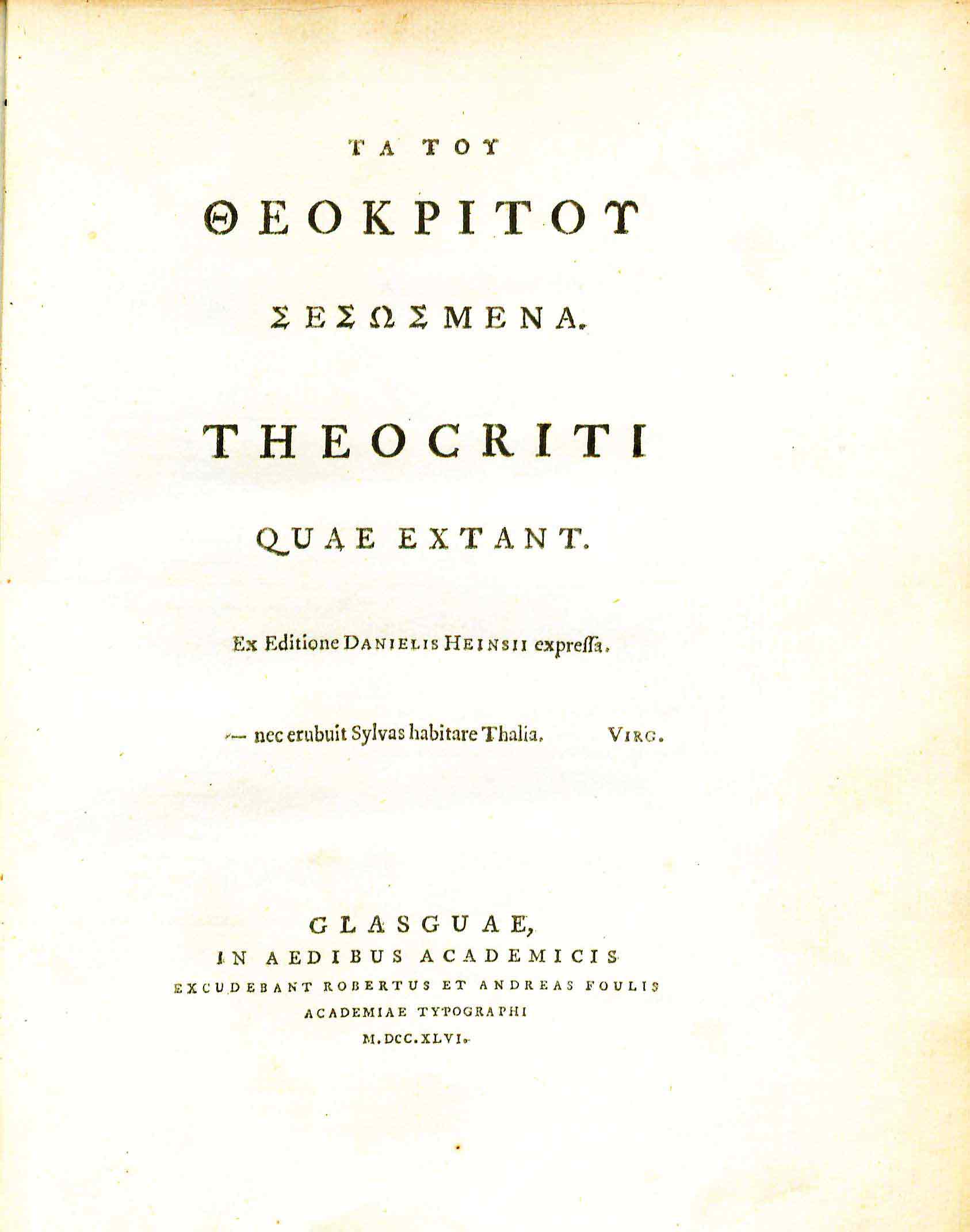Ta tou Theokritou Sesomena = Theocriti Quae Extant
by Theocritus
| Ta tou Theokritou Sesomena = Theocriti Quae Extant | |
|
Title page from Ta tou Theokritou Sesomena = Theocriti Quae Extant, George Wythe Collection, Wolf Law Library, College of William & Mary. | |
| Author | Theocritus |
| Published | Glasguae: In aedibus academicis excudebant Robertus et Andreas Foulis |
| Date | 1746 |
| Language | Greek |
| Volumes | 1 volume set |
Theocritus was a Hellenistic Greek poet who lived in the first half of the third century BCE in Syracuse on the island of Sicily.[1] It is possible that Theocritus lived in south Italy for part of his life and even that he visited Alexandria, Egypt, during the reign of Ptolmy II Philadelphus.[2] Evidence for this is found in the fact that several of Theocritus’ poems are set in Alexandria and directly reference Ptolemy’s palace and life under his rule, specifically poems 15 and 17.[3] He invented the genre of pastoral or bucolic poetry which focused on artfully simplistic depictions of herdsmen singing of “themselves, their loves and quarrels.”[4] Due to the relatively limited subject matter, bucolic poetry became used for allegorical comments on society and politics around the time of Virgil.[5] Theocritus’ extant works include thirty poems, several fragments of poems, and twenty-four epigrams, though the authenticity of all of them is doubtful.[6]
This work is a compilation of Theocritus’s extant poems published by two well-known and regarded Scottish publishers. Robert and Andrew Foulis (ne Faulls) were brothers who opened their own publishing company and printing press in 18th century Glasgow.[7] Robert was a barber before enrolling in University of Glasgow courses, while Andrew “received a more regular education…[as] a student of Humanity” who taught Greek, Latin and French for a time after he graduated.[8] The brothers began as booksellers and then transitioned to publishing and printing books, with Robert initiating each endeavor before later being joined by Andrew.[9] In 1740-42, Robert had other printers print that he chose to publish, but began printing his own books in 1742 which continued until his and his brother’s deaths in 1775 and 1776, respectively, when Andrew’s son Andrew took over The Foulis Press. [10] The Foulis Press primarily produced text books and other “works of learning…and of general literature,” as it was the printer to the University of Glasgow.[11] The press is unique for the plethora of variant issues and editions of published books on special paper, in special font, or even on copper plates.[12]
Evidence for Inclusion in Wythe's Library
Listed in the Jefferson Inventory of Wythe's Library as Theocritus Gr. Lat. 4to. Foul. and given by Thomas Jefferson to his grandson Thomas Jefferson Randolph. Both George Wythe's Library[13] on LibraryThing and the Brown Bibliography[14] list the 1746 edition published by Foulis—this is the edition the Wolf Law Library purchased.
Description of the Wolf Law Library's copy
Small quarto bound in contemporary calf, rebacked to style, black calf label. Contains engraved armorial bookplate of the Bishop of Kilmore, dated 1774, with later owners' signatures dated 1842 and 1942. Purchased from Michael R. Thompson Books.
View this book in William & Mary's online catalog.
References
- ↑ "Theo'critus” in The Oxford Companion to Classical Literature, ed. by M.C. Howatson (Oxford: Oxford University Press, 2011).
- ↑ Ibid.
- ↑ "Theocritus" in Oxford Dictionary of the Classical World, ed. by John Roberts (Oxford: Oxford University Press, 2007).
- ↑ "pastoral poetry” in The Oxford Companion to Classical Literature, ed. by M.C. Howatson (Oxford: Oxford University Press, 2011).
- ↑ Ibid.
- ↑ "Theocritus" in Oxford Dictionary of the Classical World.
- ↑ David Murray, Robert & Andrew Foulis and the Glasgow Press with some account of The Glasgow Academy of the Fine Arts (Glasgow: James Maclehose and Sons, Publishers to the University), 8.
- ↑ Ibid, 3.
- ↑ Ibid, 6-10.
- ↑ Philip Gaskell, A Bibliography of the Foulis Press, 2nd ed. (Winchester, Hampshire, England: St Paul's Bibliographies, 1986), 190.
- ↑ Ibid, 17-18.
- ↑ Ibid, 18-19.
- ↑ LibraryThing, s. v. "Member: George Wythe," accessed on November 13, 2013, http://www.librarything.com/profile/GeorgeWythe
- ↑ Bennie Brown, "The Library of George Wythe of Williamsburg and Richmond," (unpublished manuscript, May, 2012) Microsoft Word file. Earlier edition available at: https://digitalarchive.wm.edu/handle/10288/13433
